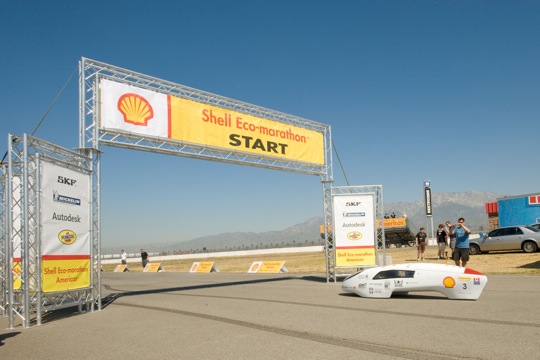Photo: Shell
This year at the Shell Eco-Marathon Americas, over 40 teams and 500 people competed to go the furthest distance on a set amount of fuel. The competition was created to inspire students to design the most fuel-efficient vehicles in a variety of categories, most notable the prototype category. This year the top prototype vehicle took home the prize with an astounding 2,757.1 MPG.
However, that number was still short of last year’s record-setting 2,843 MPG, set by Mater Del Sol High School. For more on the awards, check out the official press release:
Prototype
Grand Prize – Combustion Engine
With mileage of 2,757.1 mpg (1,172.2 kilometers per liter) the Alerion Supermileage team from Laval University in Quebec, Canada won a US$5,000 grand prize with their vehicle, NTF 3.0.
Fuel Cell/Hydrogen
The Penn State University team from University Park, Pa. achieved 1,912.9 mpg (813.2 km/l) in its Blood, Sweat & Gears vehicle.
Solar Power
The Purdue Solar Racing team from Purdue University took first place with its solar vehicle, Pulsar, which achieved 4,913 mpg (2,088.7 km/l).
UrbanConcept
Grand Prize – Combustion Engine
With mileage of 433.3 mpg (184.2 kilometers per liter) the Mater Dei Supermileage Team from Mater Dei High School in Evansville, Ind. won a US$5,000 grand prize with their vehicle, Street Buggy.
Special Awards for the 2009 Shell Eco-marathon Americas
Achieving the best fuel economy in a category wasn’t the only way to win at the 2009 Shell Eco-marathon Americas. Teams were also given the opportunity to compete for one or more Special Awards, including:
Eco-Design Award
A special “Eco-Design Award” was presented to the UCLA team for their Prototype design. Their special design not only contributed to the fuel efficiency of their vehicle, but incorporated recycled and eco-friendly materials into the vehicle and production process.
Safety
The “Safety Award” recognized three teams who made the most extensive efforts to comply with the safety regulations of the Shell Eco-marathon Americas. This award went to UNAM (Universidad Nacional Autonoma de Mexico), Grand Rapids Technical School and Loyola Marymount University. These teams all demonstrated safety as a top priority in vehicle designs and construction.
Technical Innovation
This award was presented to three teams who demonstrated outstanding initiative and technical ingenuity along with optimal use of new materials in the drive train, chassis, instrumentation and tires. First prize was awarded to Rose-Hulman Institute of Technology, second prize to Purdue University and third prize to California Polytechnic State University.
Design
The 2009 Shell Eco-marathon Americas “Design Award” was presented to the Brazilian team from Minas Gerais State University. This award recognized their innovative design research related to ergonomics, aesthetics, choice of materials and technical feasibility. The originality and overall coherence of their design were also taken into account.
Communications
This award recognized the Dalhousie University team from Canada, who made outstanding communications efforts concerning the Shell Eco-marathon. All actions throughout the year are taken into account: participation at trade shows, creation of a Web site and all other activities that successfully promote the competition, its name, its founding principle, its educational aspects, etc. in the team’s country of origin.
Best Team Spirit
The “Best Team Spirit Award” was presented to the George M. Schurr High School team who fostered cooperation and collaboration among their team and others at the competition. Not only did they demonstrate initiative to learn more about other teams and contribute to the morale at the competition, they lent a tire to another team and helped a team in need whose car wasn’t ready to compete by loaning them one of their vehicles to participate in the challenge.
Perseverance in the Face of Adversity
The “Perseverance in the Face of Adversity Award” was presented to two teams – Chitkara Institute of Engineering & Technology in India and Louisiana State University. Both teams overcame many obstacles in order to make it to the Shell Eco-marathon Americas – the team from India not only traveled a very far distance to participate in the event, they also battled many issues with their vehicle, and the team from LSU overcame the loss of a team member, who passed away last year. The team dedicated their Shell Eco-marathon project to this team member, even naming their vehicle after her, Ellen.
Popularity: 4% [?]





{ 2 comments }
A change in life style, away from the sheet metal and piston engined car, and perhaps toward a bullet-train rail mode, completely diverting jet engined air travel is in order. Small rechargeable battery commuter cars for travel to and from terminals and short destinations can all but replace modern vehicles. The horrendous expense of the modern inter-city highway system can be dispensed with, along with diesel transport trucks, by extensive rail development, rail reaching 400% efficiency for fuel, the better option. The crash, that may come if China fails to oblige Obama in his loans for a greener America will make for the initiation of an adjustment to our basic way of life. We will suffer mine-bending paradigm shifts, and social upheavals, but in the end, Americans will evolve into the twenty-first century modernized but intact and ready to move ahead towards a brighter future.
“….and this is my brother Mortimer Duke”. “Mortay my man, what it is?”
Comments on this entry are closed.